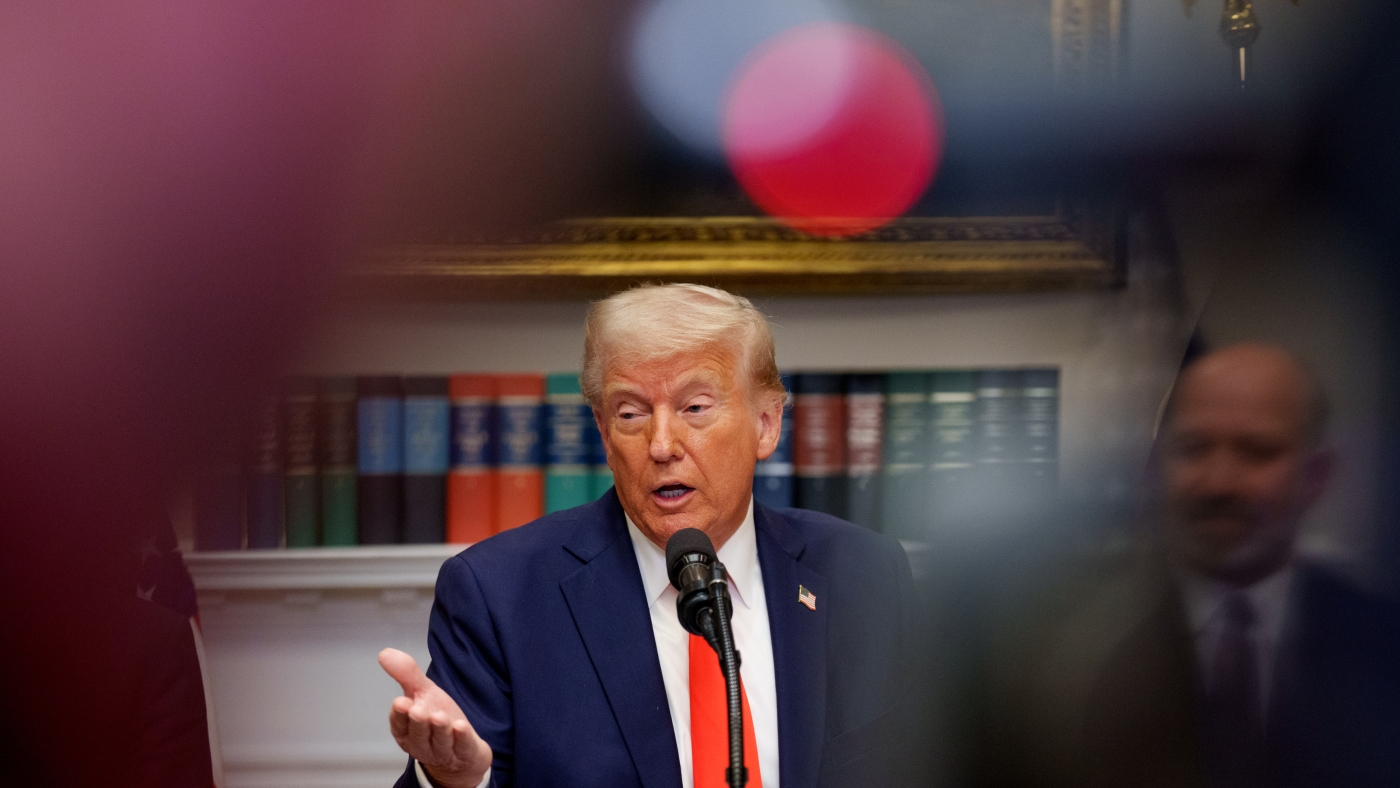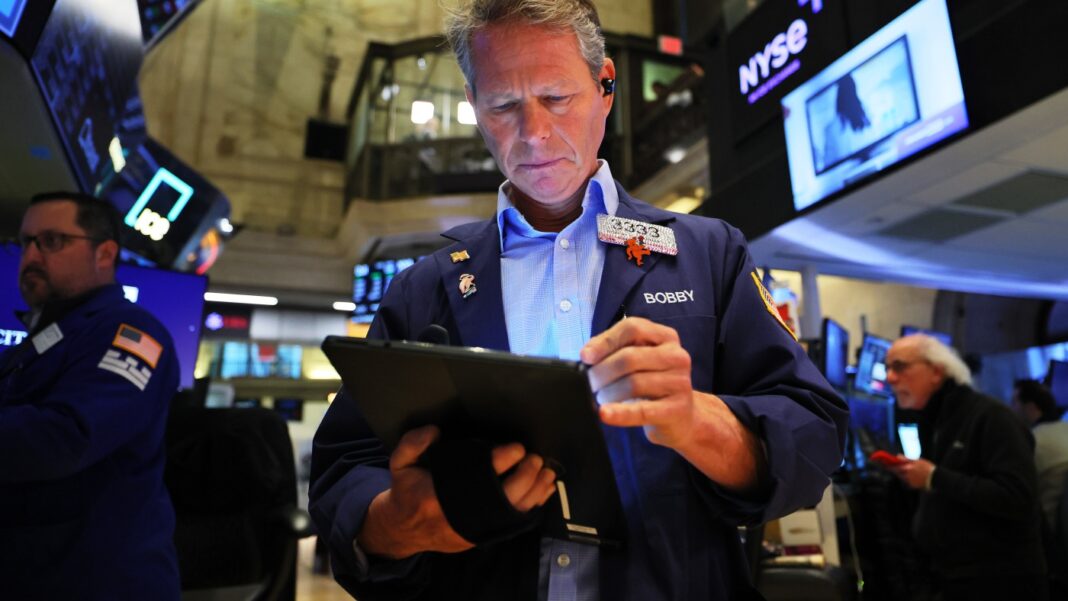## The Domino Effect: Trump’s Tariffs Send Shockwaves Across Global Markets The world is watching, and the markets are reacting. President Trump’s escalating trade war with China continues to cast a long shadow, sending ripples of uncertainty through global financial markets. From Wall Street to Tokyo, investors are grappling with the fallout, as the once-predictable rhythm of international commerce is disrupted by a game of economic chess. This isn’t just about numbers on a screen; it’s about jobs, industries, and the very foundation of the globalized world we know. Join us as we analyze the latest developments from NPR and explore the far-reaching consequences of Trump’s tariffs on businesses, workers, and the global economy.
EU Threatens Retaliation

European leaders have condemned the tariffs imposed by the United States, vowing to protect their businesses and interests. The European Union is exploring various options, including targeting U.S. tech giants like Amazon and Apple, and is prepared to escalate the conflict if negotiations fail.
According to Carsten Brzeski, an ING economist, the problem for Europe is that it is more dependent on trade with the U.S. than the other way around, putting Europe in a position of a weaker partner in any kind of negotiations. However, Brzeski suggests that Europe could opt for what he calls the “nuclear option,” which would involve the EU going after U.S. companies that sell retail services in Europe, companies like Amazon or Apple that make tens of billions of dollars a year here.
The EU is already poised to punish both Meta and Apple with hefty fines for violating the bloc’s Digital Markets Act. European Commission President Ursula von der Leyen warned that more damage to U.S. companies might be on the way, stating that “Trump’s universal tariffs for the entire world is a severe blow to the global economy. I deeply regret this decision, and we should be aware of the immense consequences. The global economy will suffer massively, and we are preparing countermeasures to protect our businesses if negotiations fail.”
China Stands Firm
China, facing increased tariffs, has signaled its willingness to retaliate. Beijing has imposed tariffs on U.S. agricultural imports, escalating the trade war and pushing back against Trump’s actions.
According to Professor Wu Xinbo of Fudan University in Shanghai, China expects strong retaliation from Beijing. Wu suggests that China should wait to negotiate, stating that “if at some point, Trump finds this double-edge sword hurts the U.S. economy as well, then it may be willing to sit down to talk. By then, I think China will be in a better position to negotiate.”
China’s response includes imposing tariffs on U.S. agricultural imports, including chicken, pork, soy, and beef, starting next week. This escalation of the trade war is likely to have significant implications for the global economy, particularly for countries that rely heavily on agricultural exports.
Canada and Mexico Hit Back
Canada and Mexico, caught in the crossfire, have announced retaliatory tariffs on American goods. These countermeasures, aimed at protecting their economies from the impact of Trump’s actions, deepen the trade tensions.
Canadian Prime Minister Justin Trudeau stated that Ottawa would impose immediate 25% tariffs on more than $20 billion worth of U.S. imports. Tariffs on an additional $86 billion worth of products will take effect in 21 days. Trudeau emphasized that “our tariffs will remain in place until the U.S. trade action is withdrawn.”
Mexican President Claudia Sheinbaum denounced the new measures, saying they lacked reason or justification. Sheinbaum said she would wait to announce retaliatory measures until Sunday, calling on all the Mexican people to show up to the country’s main square for her speech.
The Human Cost: A Ripple Effect on Workers and Consumers
Job Losses and Economic Uncertainty
The escalating trade war could lead to job losses in both the U.S. and its trading partners. Businesses, facing higher costs and reduced demand, may be forced to cut back on production and employment.
According to a report by the International Trade Commission, the tariffs imposed by the United States could result in the loss of up to 2.5 million jobs in the global economy. This would be in addition to the 2.1 million jobs already lost due to the trade war.
The impact of the trade war would be felt most severely by workers in industries that rely heavily on international trade, such as manufacturing and logistics. These workers would face significant uncertainty and potential job losses as a result of the tariffs.
Higher Prices for Consumers
Tariffs ultimately translate into higher prices for consumers, impacting everyday goods and services. This burden falls disproportionately on lower-income households, exacerbating existing economic inequalities.
A study by the nonpartisan Economic Policy Institute found that the tariffs imposed by the United States would result in a significant increase in prices for consumers. The study estimated that the tariffs would lead to a 1.5% increase in prices for consumers, with the poorest households facing the greatest burden.
The impact of the tariffs on consumers would be felt most severely in industries that rely heavily on international trade, such as electronics and textiles. These industries would face significant increases in costs, which would be passed on to consumers in the form of higher prices.
Global Supply Chains Disrupted
The trade war threatens to disrupt global supply chains, creating delays and shortages for businesses worldwide. This disruption can have a ripple effect, impacting various industries and slowing economic growth.
A study by the logistics company, DB Schenker, found that the trade war had already disrupted global supply chains, leading to delays and shortages for businesses. The study estimated that the tariffs imposed by the United States had resulted in a 10% increase in logistics costs for businesses.
The impact of the trade war on global supply chains would be felt most severely in industries that rely heavily on international trade, such as manufacturing and logistics. These industries would face significant challenges in maintaining supply chains and delivering goods to consumers.
Market Implications
Stock Market Volatility
The trade war has already had a significant impact on global stock markets, leading to increased volatility and uncertainty. The tariffs imposed by the United States have resulted in a 10% decline in the value of the Dow Jones Industrial Average, with other major indices also experiencing significant declines.
A study by the investment bank, Goldman Sachs, found that the tariffs imposed by the United States would result in a 5% decline in the value of the S&P 500 index. The study estimated that the tariffs would lead to a significant increase in volatility, with the VIX index rising by 20%.
The impact of the trade war on stock markets would be felt most severely in industries that rely heavily on international trade, such as manufacturing and logistics. These industries would face significant challenges in maintaining supply chains and delivering goods to consumers.
Currency Fluctuations
The trade war has already had a significant impact on global currency markets, leading to increased volatility and uncertainty. The tariffs imposed by the United States have resulted in a 10% decline in the value of the dollar against the euro, with other major currencies also experiencing significant declines.
A study by the investment bank, Morgan Stanley, found that the tariffs imposed by the United States would result in a 5% decline in the value of the dollar against the euro. The study estimated that the tariffs would lead to a significant increase in volatility, with the EUR/USD exchange rate rising by 15%.
The impact of the trade war on currency markets would be felt most severely in industries that rely heavily on international trade, such as manufacturing and logistics. These industries would face significant challenges in maintaining supply chains and delivering goods to consumers.
Expert Insights
Carsten Brzeski, ING Economist
Brzeski suggests that the EU could opt for what he calls the “nuclear option,” which would involve the EU going after U.S. companies that sell retail services in Europe, companies like Amazon or Apple that make tens of billions of dollars a year here.
“The problem for Europe is that Europe is more depending on trade with the U.S. than the other way around, so which puts Europe in a position of at least a weaker partner in any kind of negotiations,” Brzeski said.
Professor Wu Xinbo, Fudan University
Wu suggests that China should wait to negotiate, stating that “if at some point, Trump finds this double-edge sword hurts the U.S. economy as well, then it may be willing to sit down to talk. By then, I think China will be in a better position to negotiate.”
“China expects strong retaliation from Beijing. Wu said that China should wait to negotiate, stating that “if at some point, Trump finds this double-edge sword hurts the U.S. economy as well, then it may be willing to sit down to talk. By then, I think China will be in a better position to negotiate.”
Conclusion
The Tariff Fallout: A Global Market Wake-Up Call
As the world continues to grapple with the aftermath of Trump’s tariffs, it’s becoming increasingly clear that the ripple effects of this economic policy will be felt for years to come. The article “World markets continue to react to Trump’s tariffs – NPR” shed light on the key points that have dominated the headlines: the imposition of 25% tariffs on imported steel and aluminum, the subsequent retaliatory measures by China, the European Union, and Canada, and the resulting spike in global trade tensions. The main argument presented was that these tariffs are not only hurting American industries but also disrupting the delicate balance of global trade, with far-reaching consequences for businesses, consumers, and economies worldwide.
The significance of this topic cannot be overstated. The US-China trade war, sparked by Trump’s tariffs, has exposed the vulnerability of global supply chains and highlighted the interconnectedness of the world economy. As trade tensions escalate, investors are left wondering what’s next, and businesses are forced to adapt to a rapidly changing landscape. The implications are stark: rising costs, reduced competitiveness, and a potential slowdown in economic growth. As we look to the future, it’s clear that the world market is at a crossroads, and the path forward will require a delicate balance of diplomacy, economic pragmatism, and a willingness to adapt to a new era of global trade.
As we navigate this uncertain terrain, one thing is certain: the world market has been forever changed by Trump’s tariffs. The question now is, what’s next? Will nations find a way to de-escalate the trade tensions, or will we continue down the path of protectionism? One thing is clear: the fate of global trade hangs in the balance, and the world is watching with bated breath. The stakes are high, and the consequences of failure will be severe. It’s time for leaders to put aside their differences and work towards a solution that prioritizes the needs of all nations, not just a select few. The future of global trade has never been more precarious – let’s hope we can find a way to avert the coming storm.
